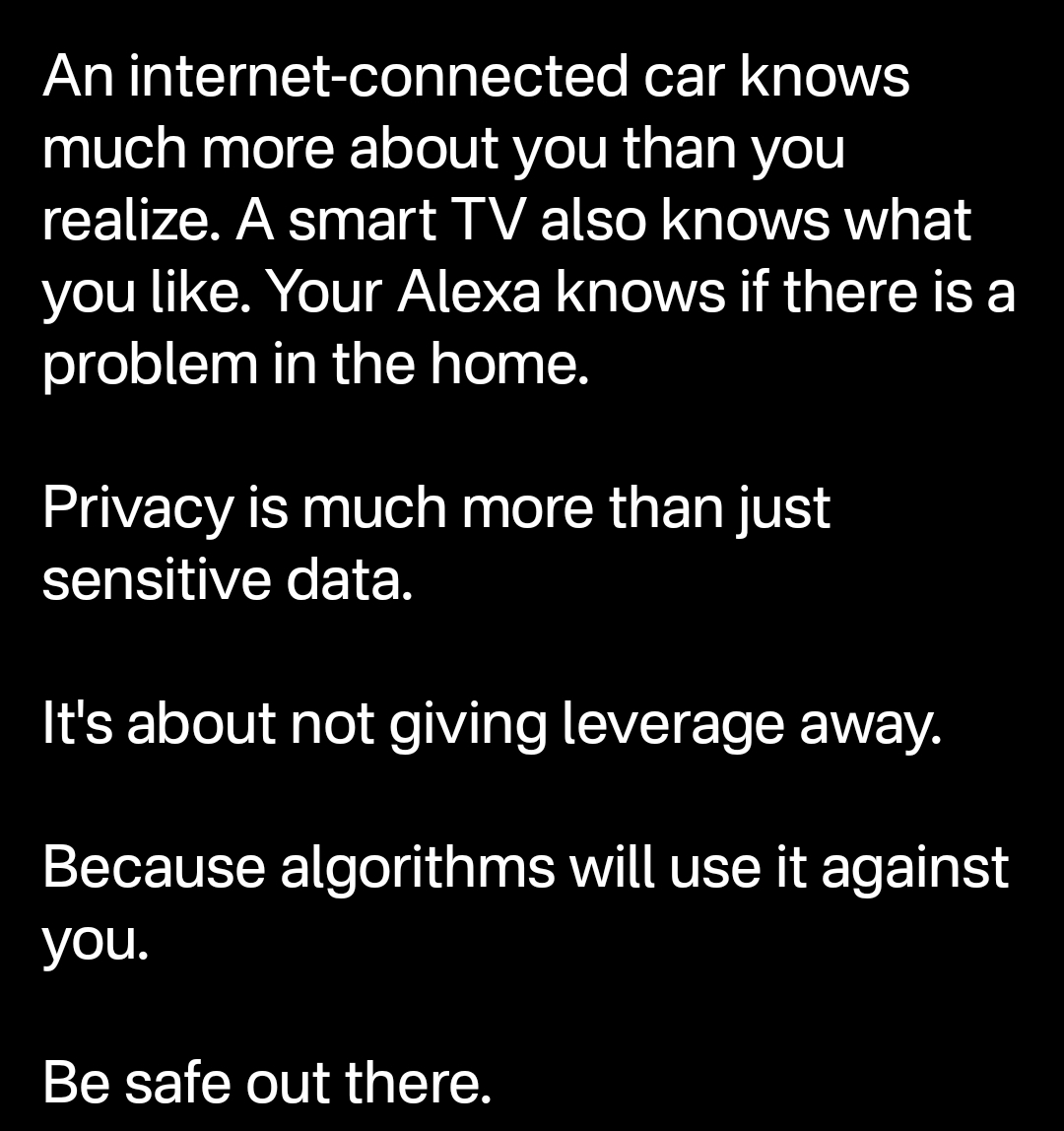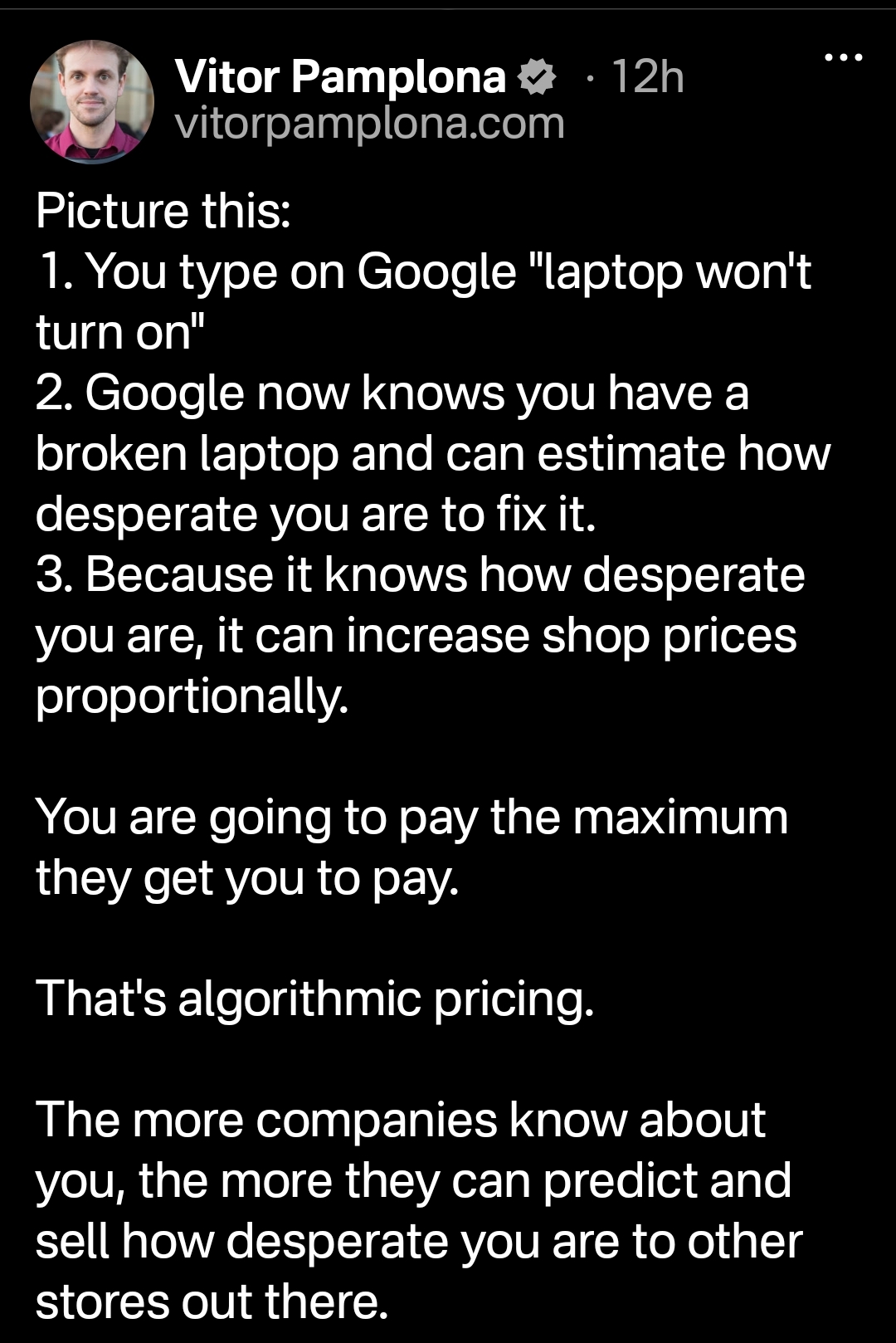guess what insurance companies make money off of ?
Microblog Memes
A place to share screenshots of Microblog posts, whether from Mastodon, tumblr, ~~Twitter~~ X, KBin, Threads or elsewhere.
Created as an evolution of White People Twitter and other tweet-capture subreddits.
Rules:
- Please put at least one word relevant to the post in the post title.
- Be nice.
- No advertising, brand promotion or guerilla marketing.
- Posters are encouraged to link to the toot or tweet etc in the description of posts.
Related communities:
If smart TVs knew what we liked, I don't think 90% of what's in the "most popular" sections of every streaming service in existence would be filled with random shit nobody has ever heard of. Unless they know what we like, and then just refuse to give us what we actually like... 🤔
You're already paying for the streaming service. They don't benefit off of giving you what you want in that scenario
Meanwhile I just noticed that my mobile provider (Congstar Germany) will be completely phasing out their online customer center in favor of their app. They already removed functionality from the site, like seeing how much data you have used this month. Why? The answer is in their huge list of third-party cookies I assume.
In a past life I wrote the software that did this.
It’s not just about charging more when you’re desperate. It’s also things like charging you less to keep you addicted, or getting you hooked. Exploiting your emotions and behaviour to make it effective. A small loss on you now could be a long time gain for them.
Some more scenarios:
- you’ve decided to quit alcohol. Your social media accounts are used to identify you’re looking for advice. They advertise more, and send you heavy, heavy discounts a few days in to keep you on the wagon.
- Your cars insurance tracker has picked up your erratic driving. Your phone has tracked more forceful interactions, your works email provider has revealed you’ve been in a minimum of three meetings all day; You’re having a shit, stressful, day. They can’t give you discounts on your cigarettes but they do know they can get you to buy two packs instead of one by serving you ads that suggest stock levels are low. You buy two and chain smoke all day, your daily average goes from 0.5 to 0.7 packs a day.
- You go to a chain restaurant often. They know they can get you to buy more in the long run if they increase the volume you eat gradually. Every visit they goad you into buying more. Didn’t do it last time? Steeper discounts next time. Until one day you buy the extra side. That’s now your new baseline. A few weeks of that and back onto the stair climb. A little by little. You’re spending more and more.
- you’re on holiday. everyone knows you’re not coming back anytime soon so they charge full price. But move to a new city? Everyone has discounts for you to get you in the door.
The data available back then was pretty minimal, effectively only the data we generated. But it was still enough to prey on your lizard brain. With data brokerage I’ve got no idea what level of evils we could have done.
Let me put on my MBA hat and propose to only show the user websites selling new notebooks and suppress repair shop or repair guide pages.
This definitely happens with ridesharing services. Whenever you look up a location it usually quotes you, but if you come back to the app like in 5 minutes, it raises the price in a funny way.
Funny, maybe its when I travel, but, I'll look up a route on Uber an hour before I plan to leave, go do something else for a while and it'll have gone down a buck or two.
I don't know how accurate this is. Every time i try googling this, i get multiple help forums (brand website, Microsoft help, reddit discussions) for how to troubleshoot, with no ads for new laptops. While i typically provide a more specific search (e.g. my laptop brand and model won't boot), i tried googling "my laptop won't turn on" and received similar, albeit less specific, suggestions.
I wonder if the original poster often searches for laptop prices to find deals and maybe it defaulted to that?
This post is posed as the next big step in internet pricing, not something necessarily happening today.
Today, it's not standard procedure outside of some specific segments (that I know of, maybe airfare? But the data fed in is more limited) but tapping into the vast amounts of data we leak through the services we use is far too big of a gold mine for companies to overlook researching and tapping into. There's a lot of things that need to happen (who supplies data? Google is the hypothetical here but what's their price? etc.) but it's absolutely feasible at scale.
Hotel and air ticket booking are like this already
OP is fearmongering. It's all good.
internet has ads?
Pretty sure that's very illegal here on Europe.
We have the freedom to pay more!
This is only a problem if the service provider is a monopoly (or if every service provider illegally coordinates price fixing).
I might be willing to pay up to $800 to fix a $1000 computer (a more expensive repair might cause me to look to buy a replacement rather than repairing). But if it's a 1 hour job requiring $100 of parts, then all the computer repair shops would be competing with each other for my business, essentially setting their hourly rate for their labor. At that point it's like bidding at auction up to a certain point, but expecting to still pay the lowest available price.
So the problem isn't necessarily perfect pricing information from the other side, but lack of competition for pricing from the other side. We should be fighting to break up monopolies and punishing illegal price fixing.
You don’t need a monopoly for this to be a problem.
Databrokers can offer data sets of “customer price elasticity”. Tables of “how much we think X would spend on these generic item categories”. Eg “booly would pay $15 for a burger, vs $10 average”
Point of Sale systems could start offering integrations to these data sets.
All shops have to do now is set a list price, a minimum price, a category, and leave it up to the PoS to (not) give discounts.
You want a burger, you’re fed a single-use short lived discount “$5 off a $20 burger. Today only” While someone else gets “buy one get one free”.
It’s then a ‘fair’ market. Shops have and ‘compete’ with their (high) list prices, data brokers compete with “excess profit” statistics (ie, how much more money above the minimum price they made). Nobody is colluding, they’re just basing discounts off external arbitrary signals.
It slowly becomes the norm to get just-in-time discounts, and the consumer gets shafted. If you’re not in the system, you’re paying more than everyone else.
(And all of this has been happening in some markets for over a decade)
I would never buy a laptop from Google anyway.
Google isn't necessarily the seller, but Best Buy, Staples, Amazon, Walmart and Target could hash out a deal with Google (or Bing, etc.) for "insights".
If you use the Internet, there's a very good chance they know just about everything anyway. They're insidious.
How could this example be modified a bit?
Maybe they know you’re an executive assistant and you search “CEO’s laptop won’t turn on“.
(Every repair shop already has the opportunity to charge desperation pricing for non-bootable machines.)
I think something got lost in translation, this isn't literally about google raising your prices but about dynamic pricing + corporations having all your data. Google is just for the example.
Also incorrect. Carry on.
Can you please explain what you read it as? Are you saying it was literal and that Dell/HP/Lenovo are raising their prices immediately from the data Google obtained by you searching for a computer repair? I was under the impression it was just an example of how info can be exploited like the person you replied to. It seems like it would lose more sales than gain if that were real, as all vendors and resellers would have to raise across the board. Like Amazon couldn't all the sudden be cheaper than you, or they'd take your sale from the manufacturers website
That’s not how selling ads works…
That's BS. Assuming you haven't degoogled, try this:
Turn off your adblocker, then spend the day talking about how much you need something, like dog food, for example. Talk about relevant things, like how much you love your dog. Then go on a PC or phone that is logged into your Google account and visit some websites that use adsense ads. And prepare to be horrified.
Where in the post did it say anything about ads?
We're well past ads. There are articles that airlines will change prices on you based on your history. And unlike a laptop where you can go down to the store, you can pretty much only buy plane tickets online.
Was on some United flights recently with their new seatback media systems. The user experience is much better than Delta's, but also, they actively harvest your information at your seat to build a "profile" on you, they even ask you to choose the type of flight profile you want like "relax" or "fun" etc. and it modifies the content filters for you.
The kicker though, was on the last flight, when the lighting was just right that I noticed they have a pinhole camera installed on the lower left of the display, along with some IR blasters to power a proximity sensor around a software button.
Blasters likely produce enough light that the camera can see you even when the screen is off/cabin is dark. So they're likely building passenger profiles with visual data now as well, it'd be trivial to do facial recognition of "happy, sad, sleepy, etc" on top of capturing your movement in the seat. Did you just use your phone? Did you use the seatback screen? Are you reading a book? What food did you choose?
Guess I'm bringing tape with me on flights now.
*Since I looked it up for myself: How to Find Hidden Cameras on wikiHow. Specifically for IR lights, method 2 is particularly noteworthy.
TIHI.

